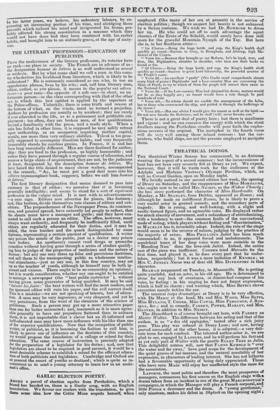THE LITERARY PROFESSION—EDUCATION OF PUBLICISTS.
nom the modernness of the literary profession, its votaries have no rank—no place in society. The French are in advance of us : the designation homme de lettres is as well understood as avocat or medecin. But by what name shall we call a man in this coun- try who derives his livelihood from literature, which is likely to be understood? He is commonly considered as one who, to use an opprobrious phrase, lives by his wits; and, call him literary man, editor, author, as you please, it means to . the popular ear adven turer—a poor man—the opposite of a safe one—in short, an un fortunate person—in the class corresponding with that of the other sex to which this last epithet is applied by the' reporters at the Police-offices. Unluckily, there is some truth and reason at the bottom of what, on the whole, must be termed a prejudice. Authors by profession are usually so by accident; they are rarely if ever educated to the life, as to a permanent and profitable em- ployment: too often, they are broken men, of few qualifications beyond a familiarity with the press, and a ready style. When a man has failed in other lines, it is supposed he may safely retreat upon authorship, as an occupation requiring neither capital, morals, nor more than very ordinary abilities. Talent is too gene- rally supposed to accompany dissolute habits, and very frequently immorality stands for careless genius. In France, it is and has been long essentially different. Men are there destined for author- ship : they are bred to the profession, as highly honourable ; and unless they have passed through a regular course of education, and possess a large share of acquirement, they are not, by the judicious at least, designated by the description homnze de lettres. We have heard the title denied to many clever writers, accompanied by the remark, "Ay, he must put a good deal more into his udders (commonplace-book, suppose), before we call him homme de kilns."
The first literary designation that seems doomed to pass into currency is that of editor: we perceive that it is becoming generally intelligible; and seems to stand for a sort of equivocal profession in the vulgar mind. It is met with in advertisements —a sure sign. Editors now advertise for places, like footmen ; and, like butlers, divide themselves into classes of editors and sub- editors. The preponderance of the Newspaper Press, its common- ness, and general spread, have naturally led people to reflect, that the sheets must have a manager and guide; and they have con- sented to call such a person an editor. The office, however, must always want authority, and frequently be inefficiently filled, until editors are regularly educated for their duties, and it may be added, the true teacher and the quack distinguished by some diploma, representing a certain amount of qualification. A writer may poison the minds of the public, just as a doctor may poison their bodies. An apothecary cannot vend drugs or prescribe remedies without having gone through a series of studies qualify- ing him to judge of the properties of medicines and the nature of disease: but any one may dress up false and pernicious doctrines, and sell them to the unsuspecting public as wholesome intellec- tual stimulants,—just as any one, in this free country, may set up as the teacher of youth, although he himself may be both ig- norant and vicious. There ought to be no censorship on opinions; but it is worth consideration, whether any one ought to be entitled to manage a newspaper (the "best public instructor " ), without having given some guarantee of being qualified. It may be said "laissez les faire:" the best writers will find the most readers, and the ignorant editor will ruin his paper, and the evil correct itself. This is a mistake—we are not speaking of talents, but of educa- tion. A man may be very ingenious, or very eloquent, and yet be very pernicious, from the want of the elements of the science of publieism. Such a person may get up a more attractive paper than one far better instructed; and, inasmuch as it is more agree- able generally to have our prejudices flattered than to unlearn them, it is not improbable that a clever but an ill-informed and half-educated man may have more influence with his like than one of far superior qualifications. Now that the occupation of public riter, or publicist, as it is becoming the fashion to call him, is likely to prove one of influence on the destinies of this country, we would propose the foundation of a college or school for their education. The same course of instruction is precisely adapted for the preparation of a legislator for his duties ; and, now that legislators are about to be required in good earnest, it would be a most desirable scheme to establish a school for the efficient educa- tion of both publicists and legislators. Cambridge and Oxford are at present the resort of youths so destined; which is quite as in- consistent as to send a young attorney to learn law in an archi- tect's office.


















































 Previous page
Previous page